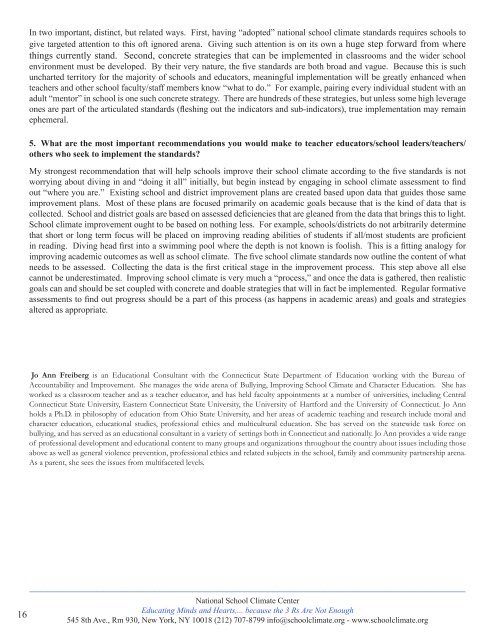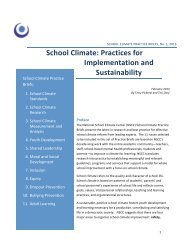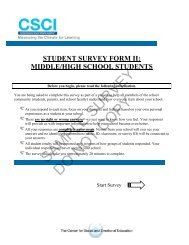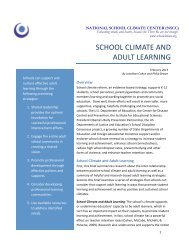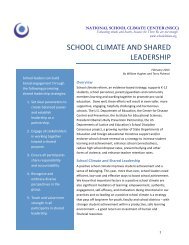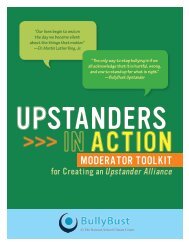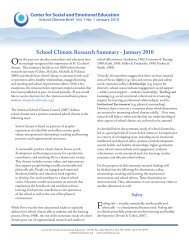Download PDF - National School Climate Center
Download PDF - National School Climate Center
Download PDF - National School Climate Center
You also want an ePaper? Increase the reach of your titles
YUMPU automatically turns print PDFs into web optimized ePapers that Google loves.
In two important, distinct, but related ways. First, having “adopted” national school climate standards requires schools to<br />
give targeted attention to this oft ignored arena. Giving such attention is on its own a huge step forward from where<br />
things currently stand. Second, concrete strategies that can be implemented in classrooms and the wider school<br />
environment must be developed. By their very nature, the five standards are both broad and vague. Because this is such<br />
uncharted territory for the majority of schools and educators, meaningful implementation will be greatly enhanced when<br />
teachers and other school faculty/staff members know “what to do.” For example, pairing every individual student with an<br />
adult “mentor” in school is one such concrete strategy. There are hundreds of these strategies, but unless some high leverage<br />
ones are part of the articulated standards (fleshing out the indicators and sub-indicators), true implementation may remain<br />
ephemeral.<br />
5. What are the most important recommendations you would make to teacher educators/school leaders/teachers/<br />
others who seek to implement the standards?<br />
My strongest recommendation that will help schools improve their school climate according to the five standards is not<br />
worrying about diving in and “doing it all” initially, but begin instead by engaging in school climate assessment to find<br />
out “where you are.” Existing school and district improvement plans are created based upon data that guides those same<br />
improvement plans. Most of these plans are focused primarily on academic goals because that is the kind of data that is<br />
collected. <strong>School</strong> and district goals are based on assessed deficiencies that are gleaned from the data that brings this to light.<br />
<strong>School</strong> climate improvement ought to be based on nothing less. For example, schools/districts do not arbitrarily determine<br />
that short or long term focus will be placed on improving reading abilities of students if all/most students are proficient<br />
in reading. Diving head first into a swimming pool where the depth is not known is foolish. This is a fitting analogy for<br />
improving academic outcomes as well as school climate. The five school climate standards now outline the content of what<br />
needs to be assessed. Collecting the data is the first critical stage in the improvement process. This step above all else<br />
cannot be underestimated. Improving school climate is very much a “process,” and once the data is gathered, then realistic<br />
goals can and should be set coupled with concrete and doable strategies that will in fact be implemented. Regular formative<br />
assessments to find out progress should be a part of this process (as happens in academic areas) and goals and strategies<br />
altered as appropriate.<br />
Jo Ann Freiberg is an Educational Consultant with the Connecticut State Department of Education working with the Bureau of<br />
Accountability and Improvement. She manages the wide arena of Bullying, Improving <strong>School</strong> <strong>Climate</strong> and Character Education. She has<br />
worked as a classroom teacher and as a teacher educator, and has held faculty appointments at a number of universities, including Central<br />
Connecticut State University, Eastern Connecticut State University, the University of Hartford and the University of Connecticut. Jo Ann<br />
holds a Ph.D. in philosophy of education from Ohio State University, and her areas of academic teaching and research include moral and<br />
character education, educational studies, professional ethics and multicultural education. She has served on the statewide task force on<br />
bullying, and has served as an educational consultant in a variety of settings both in Connecticut and nationally. Jo Ann provides a wide range<br />
of professional development and educational content to many groups and organizations throughout the country about issues including those<br />
above as well as general violence prevention, professional ethics and related subjects in the school, family and community partnership arena.<br />
As a parent, she sees the issues from multifaceted levels.<br />
16<br />
_____________________________________________________________________________<br />
<strong>National</strong> <strong>School</strong> <strong>Climate</strong> <strong>Center</strong><br />
Educating Minds and Hearts,... because the 3 Rs Are Not Enough<br />
545 8th Ave., Rm 930, New York, NY 10018 (212) 707-8799 info@schoolclimate.org - www.schoolclimate.org


